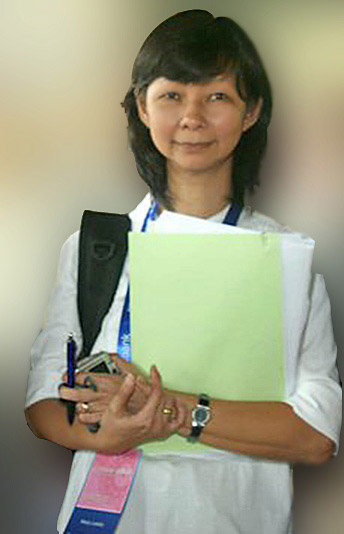Marking May as the “Short Story Month,” Words Without Borders highlights some of its stellar past publications, the Dagestani-Russian novelist Alisa Ganieva’s bitterly comic “A Village Feast” among them.

Medy Loekito (IWP 2001: poet, Indonesia; b. 1962, Surabaya) is the Executive Secretary of the Shimizu Corporation, and the President of the Multimedia Literature Institute. Her poems have appeared in more than 15 anthologies, such as In Solitude (1993); Resonansi Indonesia (2000); Graffiti Gratitude (2001), and in many journals in Indonesia, as well as in Brunei Darussalam and Australia. Representative of the Republic of Indonesia in the Conference of Asian Foundations and Organizations since 1999. Her most recent project involves participating in research on the traditional Machiya wooden houses of Kyoto, together with scholars from 4 other Asian countries.
IWP: How, and where, is your work going right now?
ML: Nowhere in particular. A lot of my time is used to analyse others’ works. Still, that is fun, since a lot of young writers from the new generation come up with their new-world-characters. So this is what I’m doing now—observing other people’s!
IWP: What book(s) are on your nightstand? What recent films or TV programs have you liked?
ML: I sleep with the work of young writers, including children’s books, within reach. Sometimes these have surprising and profound insights of life: educating a younger generation and making it fun is always a sight to behold.
Recently I have loved watching programs on environment sustainability and travel. We are now in a critical era as far of environment damages are concerned. We have to change our way of life. When I was at the Ubud Readers & Writers Festival, a TV journalist asked “what are you going to save if there is a flood?” I simply said “I will save love in everyone’s heart”. I don’t know how exactly, but I think love is what we need in order to love and take care of this world, including its environment. Being not selfish is not easy: we have to walk hand in hand.
IWP: Is there a book or an author you re-read for intellectual company?
ML: Agatha Christie. Nothing like a good mystery to sharpen the mind.
IWP: What writers, or work, do you think should be getting more attention and translation? What literary neighborhoods do you keep an eye on ?
ML: Local or traditional literary works are urgently in need of being translated. They are interesting and important: interesting because none is the same, and important because there is always local wisdom inside them, a looking glass into local cultures, a societal commentary from a different point of views, as well as history of a nation. Indonesia is a small country, but it has so many varieties of local literary works. For me, they are all interesting and important. Keeping my eye on our traditional literary works and culture is what I can do for my country.
IWP: In your view, do literary festivals and awards open up new directions? If yes, which ones do you pay attention to? And are there literary journals you follow?
ML: Festivals attract people, and anything that spreads love for literature is always good, in my book. I do not single out any of these festivals and awards as each is unique and each helps spread literature in its own way.
IWP: How do you feel about creative writing as a university-level/academic discipline?
ML: I think it is a great idea! Even Albert Einstein agreed, "Imagination is more important than knowledge. For knowledge is limited to all we now know and understand, while imagination embraces the entire world, and all there ever will be to know and understand."
While more practical subjects are preferred by a lot of people, they are severely underestimating the importance of creative writing. Did Jules Verne not write about space, air, and underwater travel before air travel and practical submarines were invented, and before practical means of space travel had been devised? In fact, the patent for a submarine periscope system was rejected because it was deemed as a 'not a new idea' because of Jules Verne's writing.
Creative writing helps people to bond with their creative side, to create a good story, make them think of how a story needs to develop in logical sequence, and trains their writing skills too. As such, I think it's very important for people to be introduced to their creativity. Ask any scientist turned author, and they will tell you the same thing.
IWP: What role should the state have with respect to culture and the arts?
ML: The state should let people express their artistic side freely, while at the same time find a way to stop the more extreme creativity. Dancing in tube tops made of sarongs should not be prevented, as it is heritage, culture, beauty. But arranging entrails artistically in a murder scene to achieve 'high art' or eating a baby for the sake of 'modern art' or thinking that exploding a building is artistic—these ideas perhaps need to be limited. Severely limited, in fact. But I assume the police would have caught them anyway.
IWP: In which (geopolitical) direction do you expect to be looking 10 years from now for major cultural changes?
ML: Given how much attention the West is giving to the East, I think there might be more growth in culture and arts from the East: the translated literatures, 2-D arts now being exported, dancers showcasing their talents on world stages. And as the influence of East grows and develops, there will be more merging between the East and the West. Soon we will see a lot of hybrid arts and literatures. And that will just make the world a little richer.
Find Us Online